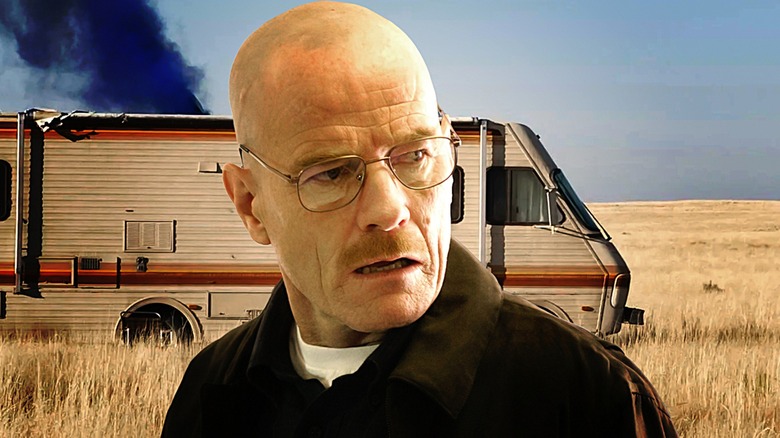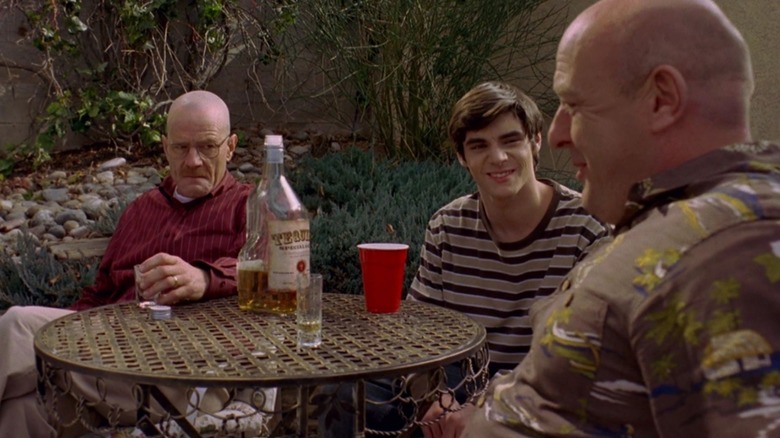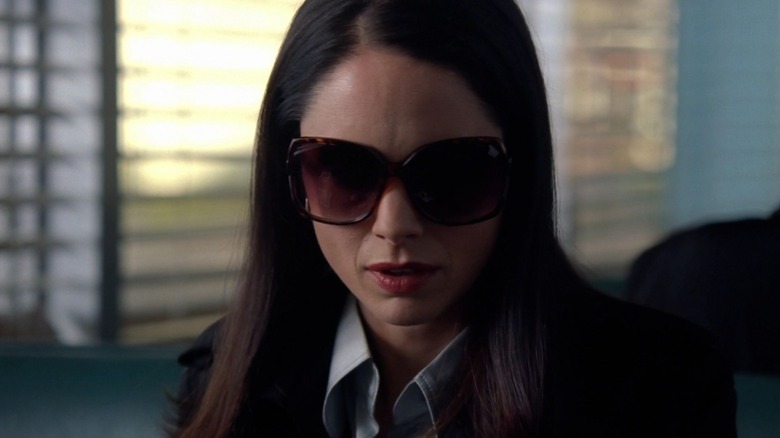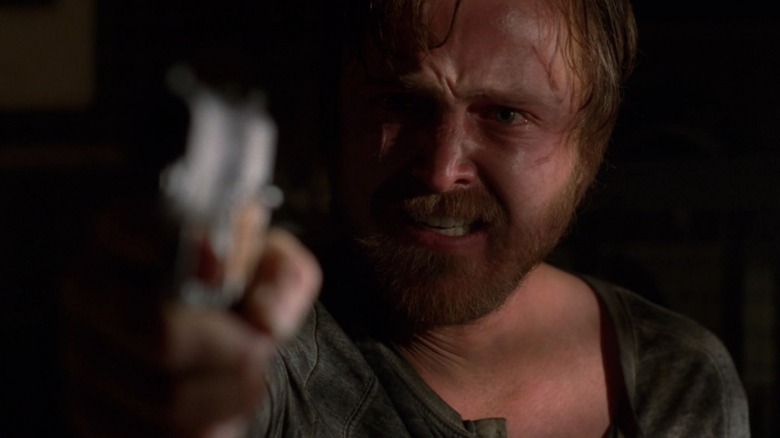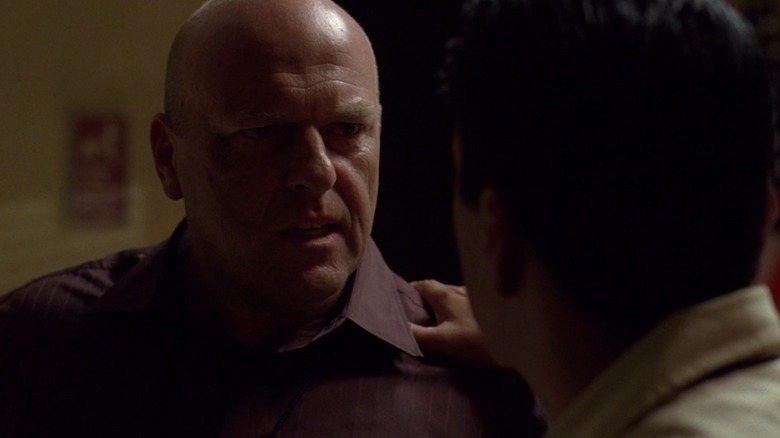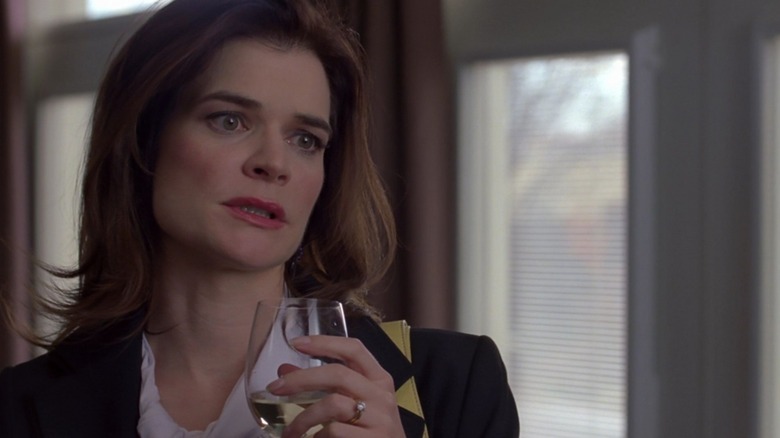The 5 Worst Episodes Of Breaking Bad, Ranked
Few shows have ever skyrocketed to the top of "best TV of all time" lists as quickly and completely as "Breaking Bad." The AMC crime drama, which aired from 2008 to 2013, has been canonized with surprising quickness, earning 58 Emmy nominations during its five-season run and inspiring one of the best TV spinoffs in the history of the medium. "Breaking Bad" is also a show whose audience seems permanently divided between two factions: those who love it as a drama full of flawed, tragic, and interesting characters, and those who genuinely root for school teacher turned meth-maker Walter White as he finds creative, scientific ways to beat his enemies.
With all of this in mind, how do we even go about talking about the bad parts of "Breaking Bad"? To do so is to reveal yourself and your read on the show, as one person's slow episode could be another's masterpiece. Are the more climactic episodes of the show better, or the more character-driven hours? Should pacing be a consideration when the show is often slow by design? And can we call an episode worse for its inclusion of unbearable moments and story beats, even if those were all part of series creator Vince Gilligan's plan?
In the end, the worst episodes of "Breaking Bad" are as subjective as the best ones. When I watched the show as it aired, I hated Walt from the start, found Jesse an all-time-great tragic hero, and appreciated the series' artistry, tension, and acting while occasionally feeling that its writing came up short. All of that is reflected in this list, which includes three episodes another /Film writer has listed as among the most underrated, and one episode that's often considered the best of the series. Every "Breaking Bad" ranking is a little different, just like every batch of blue crystal meth is a little different. Just please don't go Tuco on us about it.
5. Over
"Over" is a fairly unmemorable episode of the otherwise great second season of "Breaking Bad." Lodged between two standout hours — the desert-set standalone "4 Days Out" and Gus Fring's introductory episode, "Mandela" — the episode fails to deliver many hard-hitting moments. It begins with Walt having just received the news that his cancer is in remission, and instead of celebrating, he acts like a total weirdo, barely feigning excitement at his future and starting a family fight by giving his teen son an excessive amount of tequila.
The episode isn't that bad, but it mainly works as a building block for future plotlines, so many of its scenes aren't particularly impactful on their own. We see an alienated and lonely Skyler (Anna Gunn) grow closer to her boss Ted (Christopher Cousins), and Jesse (Aaron Paul) have his first lover's quarrel of sorts with the ill-fated Jane (Krysten Ritter). Walt also spends more screen time than expected doing home renovations and updates, a seemingly mundane choice that leads to him building the crawl space that will later famously house his massive piles of drug money.
"Over" does have one pretty great scene, and it's the last one. In it, Walt runs into a guy who's clearly trying to buy meth-making supplies at a hardware store, and slyly advises him to buy better ingredients. After the man runs off, Walt realizes he's not a partner in crime so much as a copycat infringing on his turf. "Stay out of my territory," he snarls after following the man and his companion back to his RV. It's one of the show's earliest "full Heisenberg" moments, and a highlight of an otherwise comparatively lackluster episode.
4. Madrigal
In many ways, "Breaking Bad" finished its main story arc in its fourth season. The assassination of Gus Fring (Giancarlo Esposito) put an end to the show's most enduring threat, allowing Walt and Jesse to walk away from the drug business scot-free, with Walt's brother-in-law, DEA agent Hank (Dean Norris) none the wiser. Except Walt doesn't walk away, and season 5 initially struggles to find a reason for him to stay.
Its second episode, "Madrigal," embodies these narrative growing pains well. It features some of the show's best go-to maneuvers — Walt making sneaky-smart decisions to keep people on his side, Hank failing to figure out about Walt's involvement, Jesse in anguish over his perceived badness — but by this point, without any forward momentum attached to them, they begin to seem stale. Walt tells Saul (Bob Odenkirk) he'll stay in the drug business, his reasoning thinner than ever. He also hides a ricin cigarette in Jesse's roomba to make the poor guy feel terrible about accusing Walt of poisoning a kid (which he did).
Elsewhere in the episode, Hank once again fails to put the clues that are right in front of him together, Walt sexually assaults Skyler again (in a horrifying scene that matters more in the long run than you might think), and the show introduces a new threat that's wholly underwhelming compared to the bad guys of seasons past: Madrigal Electromotive. The company will eventually play into one of the show's best episodes (we love you, "Dead Freight"!), but for now, they seem like a puzzle piece that's entering the series too little and too late. Much of the episode's runtime focuses on the death of one of their previously unseen execs and the attempts of another exec, Laura Fraser's Lydia Rodarte-Quayle, to take out Mike Ermentraut (Jonathan Banks). Rookie mistake, just-okay episode.
3. Felina
By now, Vince Gilligan's original "Breaking Bad" pitch is the stuff of legend: it's a show, he promised, about how "Mr. Chips turns into Scarface." The series finale, adored upon release, certainly delivers on the "Scarface" of it all, but it does so to the detriment of what the show had actually become. Gilligan may have pitched "Breaking Bad" as a series about Walter White turning from a good guy into a bad guy, but he was obviously never a good guy to begin with. Walt is clearly an a**hole from the series' outset, and writers knew his journey would always be one of "breaking bad," so throughout its five seasons, "Breaking Bad" centered its attention — and its heart — on the other characters whose lives Walt impacts along the way.
It's that emotional center that gets lost when "Felina" focuses almost entirely on showing fans what happened to Walt on a plot level, sacrificing complete-feeling story arcs for Skyler and Jesse along the way. The rest of the series treated Jesse as the heart and soul of the show, but here, he gets what seems to be less screen time than Lydia, a character we just met in season 5 and have no attachment to. In fact, Jesse's story was so obviously underserved by "Felina" that it took an entire additional movie, 2019's "El Camino," to wrap it up in a satisfying way. Several of the show's other best storylines, including Hank's, were resolved in earlier, better episodes of season 5.
By neglecting the other characters the show spent so much time investing in, the "Breaking Bad" series finale treats Walt as the sun around which every other character orbits, a decision that feels like the show writing towards a super-basic premise that it evolved past years earlier. The episode, which is by all accounts near-universally beloved, does have some great moments. Walt's admission that he committed crimes because he liked doing it is powerful, and Gunn and Cranston have rarely been better. But the literalization of "Scarface" in the machine-gun-laden climax is unrealistic and overlong, and the show ends with a focus shift that feels out of line with the rest of the series. "Felina" ultimately further mythologizes Walt while leaving the people he hurt most — and the people fans love most — largely offscreen and out of the action.
2. Green Light
Walter White might be a stone-cold murderer, but he's never more off-putting than when he's mistreating Skyler on screen. We see him attempt to rape her at the beginning of season 2, and in "Madrigal," he sexually assaults her again. The season 3 episode "Green Light" also devotes an inordinate amount of screentime to his nasty attitude towards his wife (and women in general), making it an unusually difficult rewatch. Over the span of the hour, Walt torpedoes both Skyler's and his own careers due to his own sense of ownership over her body. First, he shows up at her workplace in an attempt to confront the man he sees as his romantic rival, Ted. When that doesn't work, he attempts to kiss the vice principal at the school where he works, and loses his job as a result.
Other subplots in the episode are equally as frustrating. Ted asks Skyler to move in with him and she says no — an oddly out-of-place exchange that serves only to highlight his ignorance and her apparent complicity in Walt's crimes. Hank, meanwhile, gets overly-aggressive in his campaign to stop Heisenberg, alienating those around him and frustrating the viewers at home. Meanwhile, Jesse makes bad meth on his own and Walt continues his self-destructive streak by firing Saul.
The episode ends with Walt receiving "his half" of the cash for a cook he wasn't actually a part of, a mistake that will instigate another beef between himself and Jesse. In terms of formal inventiveness, memorable lines, and key performances, there's not much to latch onto in this episode. Its only real highlights are a prologue in which an extra-cute Jesse charms a cashier to let him pay in meth, and a quiet moment near the episode's end in which Walt hears a radio report revealing that Jane's dad — who was responsible for the plane crash at the end of season 2 — tried to kill himself. "Green Light" is an unpoetic and dismal episode of "Breaking Bad" that makes us wonder, ever so briefly, why we care about any of these people.
1. Open House
Poke around a few "Breaking Bad" fan forums, and it's likely that you'll find several posts dedicated to hating "Open House." With the exception of the polarizing season 3 episode "Fly" (sorry, "Fly"-haters, /Film loved that one), this season 4 episode seems to be the most detested of the series, in large part because it slows down the action and spins its wheels with a character we've never spent much time with before. Much of the hour revolves around Marie Schrader's (Betsy Brandt) compulsive shoplifting, here escalating into a fixation on open houses, which she steals from while crafting entire new personas until she's finally caught.
Marie's plot offers plenty to think about, reminding us that everyone seems to want a way out of the suburban boredom Walt was mired in at the beginning of the series and asking viewers to consider the ways in which characters look at crime differently when it involves their own family. But it's also a narrative quagmire that slows down what is otherwise an incredibly well-paced season. Plus, the other plots in the episode aren't much better: Jesse continues to party and spiral after his latest guilt-fueled breakdown, while Hank gets his hands on a key piece of evidence that he (as usual) fails to connect to Walt.
The episode could've easily contrasted Marie's life with Skyler's, but it instead puts Skyler in an unusually powerful position, as she runs a scheme to take over the car wash Walt once worked at. Walt himself has a minimal presence in "Open House," and Skyler's power move is a small highlight in an otherwise less-than-thrilling episode. Is "Open House" bad? Not really, but a show like "Breaking Bad" trains viewers to see every bit of screen time as precious, making a side character departure like this one a non-starter by design.
